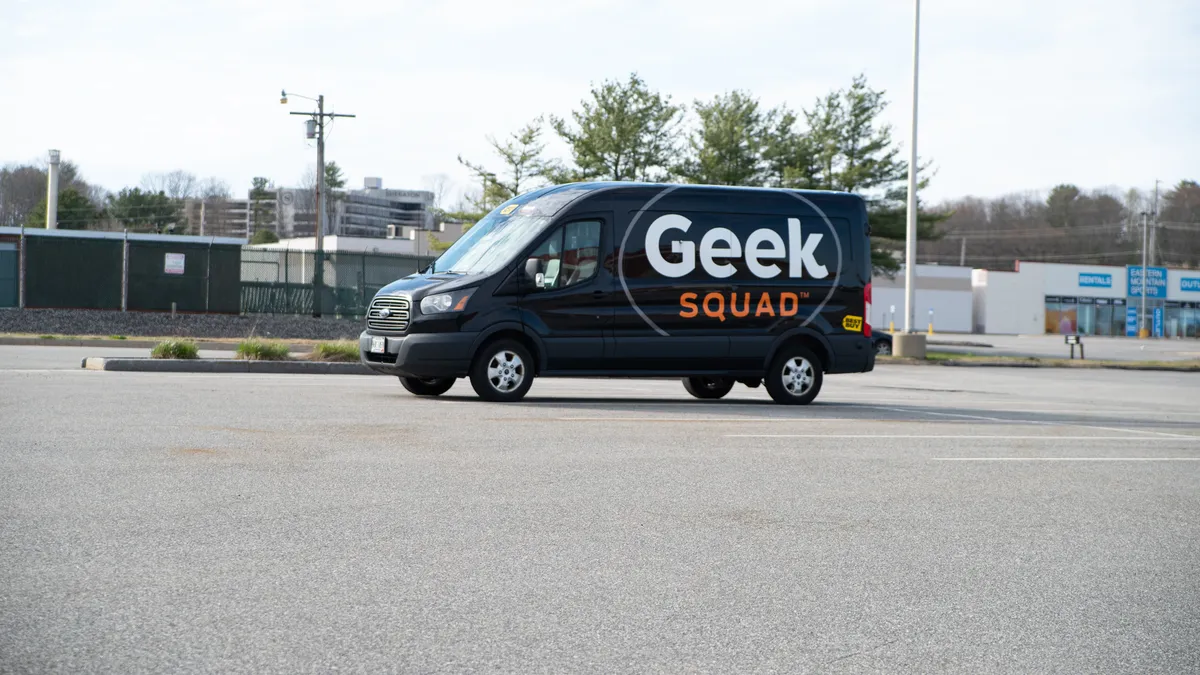Dive Brief:
-
A clear preference for shopping in stores was seen in Best Buy's second quarter report Tuesday, as U.S. consumers — which CEO Corie Barry noted have been bolstered by government support — continue to acquire and upgrade their home theaters, appliances, computing, mobile phones and services.
-
U.S. revenue in the period rose 20.6% year over year to $11.01 billion, while online revenue fell 28.1% to $3.49 billion. U.S. e-commerce as a percentage of revenue fell to about 31.7% from 53.1% last year. Including international sales, revenue rose 19.6% to $11.8 billion.
-
Store comp sales growth of 20.8% helped drive the revenue increase, partially offset by lost sales due to permanent store closures in the past year, according to a company press release. Net income rose 70% to $734 million, and the company raised its outlook for the year.
Dive Insight:
Best Buy is in decent shape as it prepares for some upcoming new challenges.
The electronics retailer has held its own against Amazon in its category, to the point where, three years ago, the e-commerce giant actually turned to Best Buy when it launched its Fire televisions. Already adept at fulfilling some online orders from stores, Best Buy also nimbly shifted to curbside pickup last year when stores had to temporarily close in order to stem the pandemic.
That pushed up its online sales, but those are now coming down as consumers head to stores. In person shopping is especially important to electronics shoppers because they want to see the merchandise and get advice, according to GlobalData Managing Director Neil Saunders.
The company's second quarter e-commerce decline "underscores the falsity of the 'online will accelerate indefinitely' and 'all pandemic online gains will stick' narratives," Saunders said in emailed comments. "Naturally, online is a much more significant part of Best Buy's business now than in 2019 (penetration of 31.7% this quarter versus 16.1% in the same period of 2019) but, from our data, what is most important is very solid omnichannel execution."
In emailed comments on the quarter, Moody's Investors Service Vice President Charlie O'Shea similarly credited Best Buy for "the quality of its execution and effective integration of its online and brick-and-mortar channels" as well as its tight grip on costs.
"Accompanying this surge in revenue are meaningful increases in both gross and operating margin, with operating margin doubling over 2019's level, reflecting pricing discipline and cost efficiencies, and are particularly impressive given that the quarter included meaningful promotional activity to compete with Amazon's Prime Day," O'Shea said.
Best Buy has also differentiated itself with its Geek Squad services, where technicians set up customers' gadgets and help troubleshoot challenges they encounter using technology. The retailer is testing a membership-based program of concierge services and support for products even if they were purchased elsewhere.
Best Buy isn't through battling Amazon, as the e-retailer is rumored to be plotting a department store-like model that will include electronics sales, which means it "must now double down on its store service as Amazon considers opening larger department style stores," Saunders said.
Moody's shares Best Buy's expectation for a good holiday season. "Category strength is evident across the board, with the upward revision to its guidance reflecting Best Buy's expectation that back-to-school/college and holiday selling seasons will be robust, validating our view that Best Buy will continue as one of the very best of global retail," O'Shea said.















